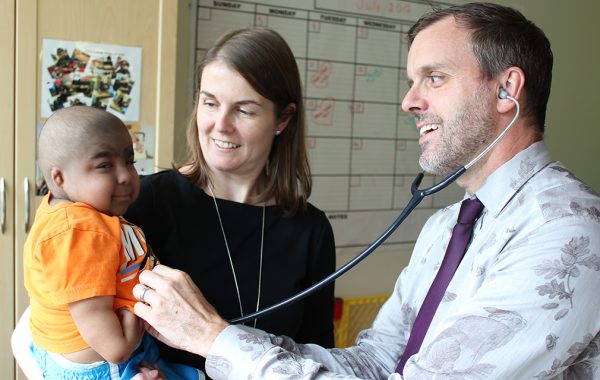Ten years ago, Alvin Moyer ’89 realized that his sister was dying. Her lymphoma had returned, and Moyer, a trained physician, knew that her health would only continue to deteriorate. Her doctors at the hospital, however, seemed unwilling to state the obvious.
As Moyer recalled, the doctors would explain developments in detached, clinical jargon, leaving him to translate for his befuddled family. When the family resisted certain extreme interventions for his sister in her final weeks, the doctors were unreceptive. “We had to beg them to discharge my sister from the hospital and let her come home,” Moyer said.
Eventually, the hospital acquiesced, and his sister passed away at her house, surrounded by her husband, children, and dog. But the experience at the hospital stuck with Moyer.
At the time, he was a general practice pediatrician at a private clinic, where he’d gotten extensive exposure to children with serious health needs. Following his sister’s death, he pivoted to palliative care, dedicating his career to providing more thoughtful treatment that caters to the values of medically fragile children and their families. “It inspired me,” he said.
Today, Moyer directs the palliative care program at the nonprofit Elizabeth Seton Pediatric Center in Yonkers, N.Y. Children arrive at Seton with a variety of genetic and metabolic conditions, from cerebral palsy to brain injuries to cystic fibrosis. And because 90 percent of Seton patients suffer from a neurological illness or injury, treatment requires understanding the myriad ways that the brain functions and interacts with the body. For Moyer — who became fascinated by the brain while studying neuroscience at Colgate — it’s compelling work. “I like the complexity of it,” he said. “It’s a big ol’ puzzle.”
Every Wednesday, Moyer meets with patients and their families to create and update care regimens, helping alleviate discomfort and make life more fulfilling. Those plans vary as much as the patients themselves: Moyer regularly prescribes treatments ranging from speech therapy to massage to hydrotherapy to pet therapy, and he consults closely with in-house social workers, pharmacists, dieticians, and other specialists. In between treating patients, he travels around the New York metropolitan area meeting potential patients in order to determine if Seton would best meet their needs.
One of Moyer’s greatest contributions at Seton has been to the protocols surrounding death. Working with colleagues, he devised the center’s Compassion Code, intended to replace the panicked urgency that often accompanies death with a more holistic and peaceful approach, focused on managing patients’ symptoms and addressing the families’ needs.
He describes a recent Friday afternoon when a patient, a boy from a devout Muslim family, began actively dying. That’s when the Compassion Code kicked in. The staff explained to the parents in clear language what symptoms they could expect, which treatments were available, and the names and phone numbers of staff on hand to help. Meanwhile, an art therapist helped the family cope by making “legacy projects” — his parents recorded themselves singing Quran verses to their son, while his siblings made clay imprints of their hands entwined with their brother’s.
Such a face-forward attitude toward death can be jarring, Moyer acknowledged, particularly in American culture, where accepting death is often equated with accepting defeat. But when facing the inevitable, he knows that honesty can be a blessing. Moyer recalled the sense of denial surrounding his sister’s death.
“No one ever said the words, ‘Your loved one is dying,’” he said. “Our society is so geared toward cure: ‘We will fix this, we’re the best at doing it.’ We don’t accept that sometimes we don’t fix it.”
Helping his patients and their loved ones find that acceptance is the final treatment that Alvin Moyer can offer.
— Jake Smith







